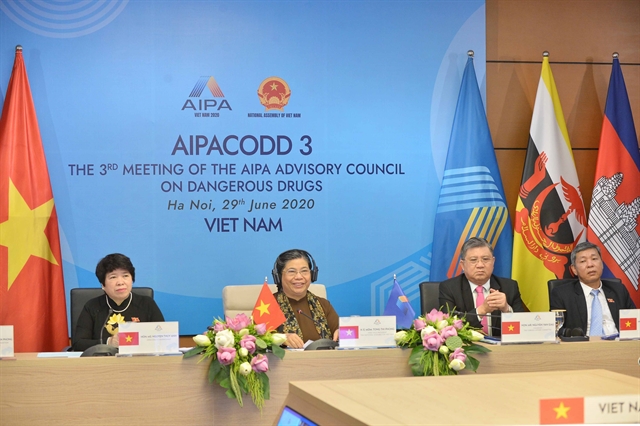 Politics & Law
Politics & Law

As a responsible member of the international community, Việt Nam has taken an active and proactive part in global and regional anti-drug activities.

|
| Vice Chairwoman of the National Assembly Tòng Thị Phóng (second from left) delivers the opening speech at the third meeting of the ASEAN Inter-Parliamentary Assembly Advisory Council on Dangerous Drugs. — VNA/VNS Photo Phương Hoa |
HÀ NỘI — Non-traditional security threats like environmental pollution, cybercrime, food and water resources insecurity, epidemics, and especially drugs are urgent and long-term issues facing regions and the world, said Vice National Assembly Chairwoman Tòng Thị Phóng.
She made the statement at the third meeting of the AIPA (ASEAN Inter-Parliamentary Assembly) Advisory Council on Dangerous Drugs (AIPACODD), which was held online on Monday to enhance regional co-operation towards a drug-free ASEAN.
“The scourge of drugs around the globe, including in Southeast Asia, is increasingly complex, leaving long-term health, economic and social consequences for all countries,” Phóng said.
Since the beginning of this year, the COVID-19 pandemic has added another non-traditional security threat to countries worldwide, including ASEAN members, requiring solidarity and co-operation to respond, she said.
As a responsible member of the international community, Việt Nam has taken an active and proactive part in global and regional anti-drug activities, Phóng said, adding that its policies and laws are consistent with the common view in ASEAN of not compromising on drugs, not accepting legalisation of drug use, balancing supply and demand reduction solutions, and persisting with the goal of a drug-free ASEAN.
Việt Nam’s legislature has made efforts to perfect legal regulations on and increase supervision over this matter, she said. It will soon amend the law on drug prevention and control and some related laws to cope with new challenges in the fight against drugs.
An important activity during Việt Nam’s AIPA Chairmanship this year, the meeting was attended by the AIPA Secretary-General and representatives from AIPA member parliaments, international organisations and ASEAN countries in Việt Nam.
Participants at the meeting heard about drug prevention and control efforts in the region and the world, along with ASEAN’s drug response. They also discussed and shared their countries’ experience in the drug fight and treatment of drug addiction, while reviewing the implementation of commitments made in resolutions issued at meetings of the AIPA Fact-Finding Committee and the AIPACODD.
Inshik Sim, a research officer at the UN Office on Drugs and Crime, said the annual profit from illegal drug production and trafficking in Southeast Asia is estimated at US$$71 billion. The drug issue in this region is now fiercer than ever and has become a crisis, with consequences for health, human rights, security, and economies.
He added that no interventions, policies, or prevention mechanisms can be built or implemented alone, noting that an effective prevention system at the local or national level should be integrated into a larger system, focusing on health care, and balancing drug-related issues, including reducing supply, enforcing laws, treating drug-related disorders, and minimising risks relevant to drug use.
Deputy Minister of Labour, Invalids and Social Affairs Lê Văn Thanh suggested that to push ahead with the drug fight, Việt Nam and other ASEAN countries should promote political commitments; improve the efficiency of state management in drug prevention, control, and rehabilitation; and engage the entire political system and people in the task.
They should also combine solutions on drug prevention and control with those on drug supply, demand, and harm reduction, he said, adding that they should view investing in the drug fight like investing in sustainable development. — VNS




